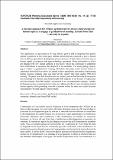A strategic approach for African Agricultural Universities experiencing low human capacity to engage in graduate-level training: Lessons from Gulu University in Uganda

View/
Publication Date
2016Author
D Ongeng, Irene Lynette Akidi, Winnifred Ajok, Prossy Nassanga, W Odongo, SW Kalule, EK Kule, EK Ndyomugyenyi, P Omara, B Mugonola, Mario Piedra, C Nakkazi, DR Kugonza, A Kayitesi, H Mulindwa, MW Okot, PM Mshenga, NP Carsten, MA Olufemi, K Manjur, Bassey Etim Udom, S Omovbude, PO Abam, Joy John Oluchi, Joy Ehilegbu, ES Erondu, U Zakka, AA Tanimola, EC Wokoma, Idier-Ipelm Brown, BA Odogwu, S Nkalubo, P Rubaihayo, BO Nuga, VE Osodeke, DO Asawalam, OM Adesope, PM Mashenga, B Mugunola, CNP Hjortsoe, CC Wigwe
Metadata
Show full item recordAbstract/
The significance of agriculture in driving Africa’s growth and development has greatly
gained recognition in the recent past. African universities are expected to play a critical
role in African agricultural development process because of their inherent pivotal role in
human capital development and agro-technology generation. Many universities in Africa
are plagued with low human capacity, a key factor, which has continued to undermine
their contribution to economic development in the continent. The most glaring capacity
gap is evident at graduate-level training. Therefore, this paper shares lessons based on
experience from Gulu University in Uganda on how agricultural universities experiencing
human resource capacity gaps can innovatively venture into high quality PhD-level
training. The paper describes innovation in curriculum process that led to the development
and mounting of a thematic area-based taught PhD program in the Faculty of Agriculture
and Environment. This PhD model is considered as an “accommodative strategy” suitable
for human resource-constrained universities as it allows for effective use of existing limited
human capacity while providing room for expansion within the same curriculum structure
concomitant with staff capacity improvement.
